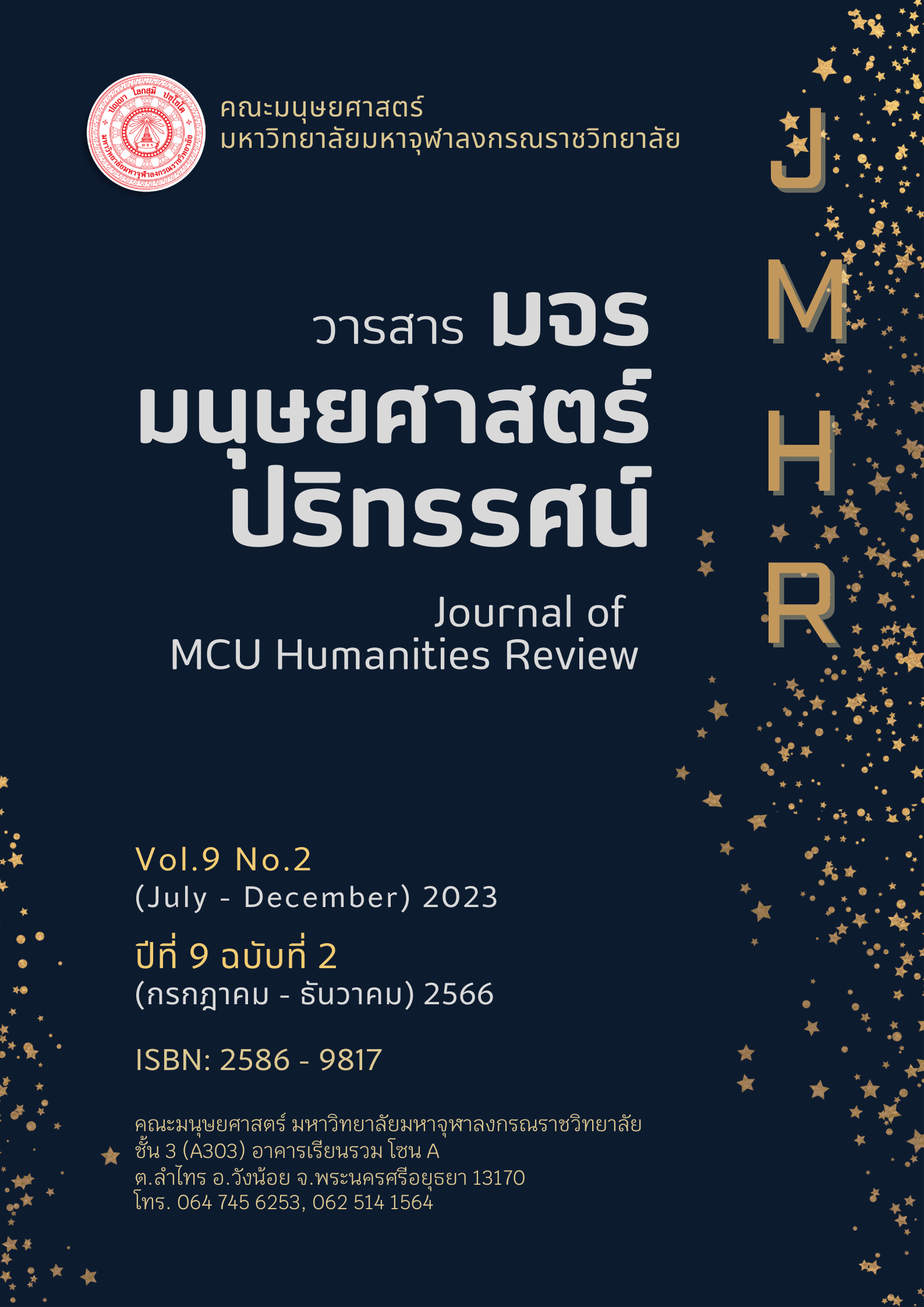พุทธจิตวิทยากับการดำเนินชีวิตอย่างมีความสุขในโลกปัจจุบัน
คำสำคัญ:
พุทธจิตวิทยา, การดำเนินชีวิต, ความสุข, โลกปัจจุบันบทคัดย่อ
บทความวิชาการนี้มีวัตถุประสงค์เพื่อศึกษาแนวทางการดำเนินชีวิตแบบองค์รวม โดยนำหลักการทางพุทธศาสตร์ ที่มุ่งสอนให้ผู้ปฏิบัติตระหนักรู้การทำงานของจิตใจ และรู้เท่าทันธรรมชาติของจิตตนเอง เพื่อหาสาเหตุและหนทางในการดับทุกข์ และนำมาประยุกต์กับพฤติกรรมกระบวนการทางจิตตามหลักของจิตวิทยา จนกลายเป็นศาสตร์พุทธจิตวิทยา (Buddhist Psychology) ที่สามารถอธิบายสาเหตุของพฤติกรรมและเป็นศาสตร์ที่สามารถนำมาปรับใช้กับการดำเนินชีวิตภายใต้สภาพแวดล้อมทางสังคมที่เปลี่ยนแปลงอย่างรวดเร็ว โดยมีผลการศึกษาที่สื่อถึงหลักการทางทางพุทธจิตกับการตัดสินใจที่สะท้อนพฤติกรรมของผู้บริโภค เช่น เหตุผลของผู้บริโภคในการตัดสินใจเลือกซื้อเครื่องสำอางเพื่อความสวยงามและส่งผลต่อความสุขทางใจ เป็นต้น รวมถึง มีการใช้หลักพุทธจิตวิทยาของกลุ่มคนชายขอบในการพัฒนาตนเองจนเป้นที่ยอมรับในสังคม อีกทั้งแนวทางที่จะปรับใจให้มีความสุขด้วยหลักพุทธจิตวิทยาที่แท้จริง คือ การฝึกสมาธิ ซึ่งเป็นส่วนหนึ่งในการพัฒนาศักยภาพทางความคิดที่ส่งผลต่ออารมณ์และความคิดสร้างสรรค์ ผลการศึกษาพฤติกรรมด้วยคลื่นไฟฟ้า พบว่าผู้ที่ฝึกกำหนดลมหายใจส่งผลโดยตรงต่อการควบคุมอารมณ์และการเปลี่ยนแปลงคลื่นไฟฟ้าสมอง ดังนั้น การฝึกสมาธิตามหลักพุทธจิตวิทยา สามารถสร้างการเปลี่ยนแปลงทางร่างกายและจิตใจไปในทางที่ดีขึ้นและเป็นแนวทางสำคัญในการดำเนินชีวิตภายใต้สภาพแวดล้อมและสังคมในปัจจุบัน
เอกสารอ้างอิง
กรมสุขภาพจิต. (2566). การเสริมสร้างความเข้มแข็งทางใจ. สืบค้น 21 พฤศจิกายน 2566, จาก https://shorturl.asia/wFMd8
ชมพูนุท ศรีจันทร์นิล. (2552). จิตวิทยาแนวพุทธ: แนวทางเพื่อการเยียวยาและพัฒนาจิตใจมนุษย์.วารสารวิชาการ มหาวิทยาลัยหอการค้าไทย, 29(4), 188-208.
ตระกูล พุ่มงาม และ สุวัฒสัน รักขันโท. (2564). สุขภาวะแนวพุทธของผู้สูงวัย. มจร มนุษยศาสตร์ปริทรรศน์, 7(1), 467-480.
พระครูปลัดมารุต วรมงฺคโล. (2553). การศึกษาวิเคราะห์พุทธจิตวิทยาในพระไตรปิฎก. วารสารสันติศึกษาปริทรรศน์ มจร, 7(sp1), 25-34.
พระครูสังฆรักษ์ทวี อภโย. (2563). พุทธจิตวิทยาสำหรับคนชายขอบ. วารสารมหาจุฬานาครทรรศน์, 7(8), 15-29.
พระมหาโสภณ วิจิตฺตธมฺโม และ พนัทเทพ ณ นคร. (2560). พุทธจิตวิทยากับการปรับเปลี่ยนพฤติกรรมมนุษย์ตามหลักสติปัฏฐาน 4. วารสารพุทธจิตวิทยา. 2(2), 59-72.
พินิตศรี จีนชัยภูมิ และ สุมาลี สว่าง. (2562). พุทธจิตวิทยากับการวิเคราะห์ความสัมพันธ์เชิงสาเหตุที่มีอิทธิพลต่อพฤติกรรมการตั้งใจซื้อเครื่องสำอางสำหรับตกแต่งใบหน้า (Makeup). วารสารมหาจุฬานาครทรรศน์, 6(7), 251-264.
เริงชัย หมื่นชนะ. (2560). ระบบและทฤษฎีพุทธจิตวิทยา. วารสารมหาจุฬาวิชาการ, 2(1), 63-78.
ศิลาวัฒน์ ชัยวงศ์. (2556). เศรษฐศาสตร์แนวพุทธกับการพัฒนาความสุข. วารสารวิทยาลัยสงฆ์นครลำปาง, 2(2), 1-8.
สันติ เมืองแสง. (2563). สิ่งที่ทุกคนปรารถนา : กายแข็งแรง ใจเป็นสุข (สารนิพนธ์พุทธศาสตรบัณฑิต). มหาวิทยาลัยมหาจุฬาลงกรณราชวิทยาลัย. พระนครศรีอยุธยา.
ว. วชิรเมธี. (2554). ความทุกข์มาโปรด ความสุขโปรยปราย. กรุงเทพฯ: ปราณพับลิชชิ่ง.
วีรชัย คำธร, ปรัชญา แก้วแก่น และ พีร วงศ์อุปราช. (2562). ผลของการปฏิบัติสมาธิแบบกำหนดนับลมหายใจร่วมกับไบนิวรอลบีทซ์ที่มีต่อการควบคุมอารมณ์: การศึกษาเชิงพฤติกรรมและคลื่นไฟฟ้าสมอง. วารสารวิทยาการวิจัยและวิทยาการปัญญา, 17(sp2), 19-37.
Bronfenbrenner, Urie. (1977). Toward an Experimental Ecology. American Psychologist, 32(7), 513.
Jazaieri Hooria and Shauna Shapiro. (2017). Mindfulness and wellbeing. In The Happy Mind: Cognitive Contributions to Well-Being.
Williams, Mark, and Chris Cullen. (2563). Moving Beyond the Rumour Mill’ - Relating differently to thoughts and worries. In MINDFULNESS: FINDING PEACE IN A FRANTIC WORLD. Oxford Mindfulness Centre.
ดาวน์โหลด
เผยแพร่แล้ว
รูปแบบการอ้างอิง
ฉบับ
ประเภทบทความ
หมวดหมู่
สัญญาอนุญาต
ลิขสิทธิ์ (c) 2023 วารสาร มจร มนุษยศาสตร์ปริทรรศน์

อนุญาตภายใต้เงื่อนไข Creative Commons Attribution-NonCommercial-NoDerivatives 4.0 International License.






